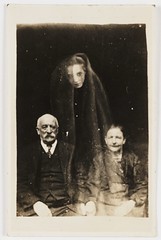 Over at the Huffington Post, Sean McCloud reflects on the continued attention given to religious disaffiliation in the American media. Using a recent NPR Morning Edition story as an example he suggests that journalists and scholars alike are actively at work constructing the ‘nones’ category and doing so in particular ways:
Over at the Huffington Post, Sean McCloud reflects on the continued attention given to religious disaffiliation in the American media. Using a recent NPR Morning Edition story as an example he suggests that journalists and scholars alike are actively at work constructing the ‘nones’ category and doing so in particular ways:
Simply put, Pew’s and NPR’s envisioning of “nones” constructs “religion” as something institutional. Conversely, one could offer an alternative reading suggesting that the vast majority of “nones” are really “somes” who hold to concepts such as a god, gods, supernatural powers and ghosts. A minority of those polled identified as atheists/non-theists/non-supernaturalists and, as Steven Ramey noted in a recent HuffPost Religion blog, about 55 percent of those put into the “nones” category even described themselves as either “religious” or “spiritual.” Like so many other examples of social scientific studies — and journalism — the Pew and NPR discussions of “nones” and “religion” did more than described things, they constituted them.
By way of Catherine Albanese, McCloud goes on to suggest the usefulness of situating the “nones” within what he considers the well worn American tradition of “combinative” religion. Read the full piece here. See also Courtney Bender and Omar McRoberts’ TIF post on the difficulties of studying the “spiritual” landscapes traveled by some of these so called “nones.”












Considering the Pew Forum’s post, “Nones on the Rise” from October 2012, and my own identification as a “none,” I found this post particularly noteworthy. I agree that the majority of “nones” are really “somes,” as the longstanding religious tradition of the United States is not something easily cast aside. People may tire of the politics of religious institutions and some of the seemingly strict rules that surround an identity as a particular denomination of Christianity, Judaism, or other specific religion, but the belief in God is something that can transcend the idea of institutions. In the aforementioned Pew poll, 91% of the US general public admitted a belief in God or a universal spirit. Of the unaffiliated public, 68% said “yes” in some manner to the question of belief. That is then further broken down into “Atheist/Agnostic” and “Nothing in particular.” The latter group, what we might call the “nones” in this case, saw 81% of the group admitting to a belief in God or a universal spirit (source: http://www.pewforum.org/Unaffiliated/nones-on-the-rise-religion.aspx#god).
This “nothing in particular” category is especially striking in light of McCloud’s article on the perception of religion in regard to identifying “nones.” There is seemingly a trend of religious disaffiliation in the institutional sense of religion, but not spiritual disaffiliation: people still believe in g/God(s). The “combinative” idea presented is a very American one, religion or otherwise. We have become a trend-oriented society in many ways, and this step in combining different parts of Christianity, astrology, Buddhism, etc. is an easy window into this greater idea of combinative living. With that said, Bender and Roberts’ TIF post mentioned at the end of this one warrants close consideration, as the differentiation of religious and spiritual study becomes more important in this modern society that shirks religious institution but still believes in God.